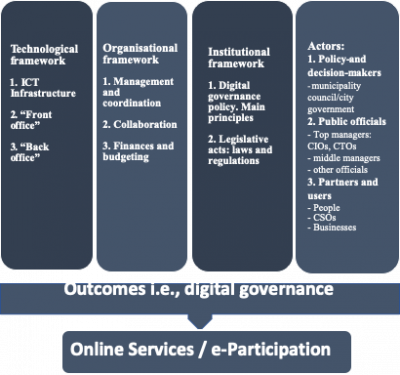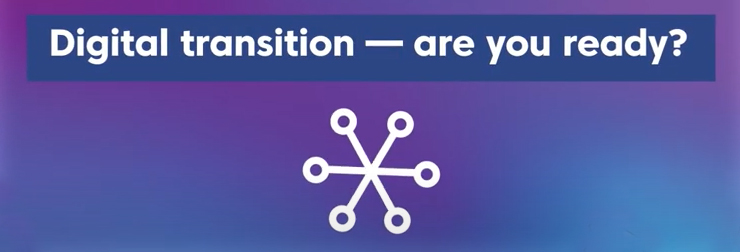
Take a trip down memory lane with us. Re-discover stories and reflections that we've captured over the last years. This article was first published in 2019 and, yet, is more relevant than ever, with digital transition at the heart of EU cohesion policy objectives and the URBACT Programme.
Digitalisation is omnipresent in today’s social and urban life and URBACT cities are seizing the opportunity. As Alison Partridge, Lead Expert of the TechRevolution 2.0 and the TechRevolution Transfer Networks, always advocates cities need to ‘adapt or die’. for many years: “cities of all sizes need to better understand the opportunities offered by digital and tech and jump on them to grow higher value jobs and start-ups for local people”. Indeed, at all levels of society and of governance, services and products are going digital: online availability, digital tools for access, compiling and using data to proceed to meta-analysis.
The transition to a society based on “virtual”, intangible, vectors, using computing techniques and algorithms – a digital transition - is growing in European cities, meaning more intrusions in our daily lives.
“The use of new technologies to communicate and access information is changing the way society works”
states the Action Plan of the Digital Transition Urban Agenda Partnership because “citizens live an increasingly digital life both in the public and private sphere”.
Beyond the digital divide issue, private data protection and free choice, this trend follows new consumption and production patterns, as well as interaction between people.
Taking advantage of digital transition’s potential is an asset for cities, not only for business development and job creation, but also for city governance and getting closer to citizens, thus developing more integrated governance approaches at city level. That is the way URBACT cities have approached their digital transition over the last 15 years – as a means of driving change in cities.This article, written by URBACT Expert Marcelline Bonneau, presents a few cases from URBACT cities and Urban Agenda Partnerships, which can inspire other cities.
Digital transition as a goal: transforming cities’ local economic development
Cities are taking advantage of digital transition as a goal in itself. Indeed, the digital sector has been and should be developed. Creating “smart cities” is now appearing in more and more cities’ strategy as a way to achieve competitive advantage. Focusing on local economic development, as a new way of addressing emerging societal issues such as environmental and social ones, requires strong leadership, commitment and investments.
For some URBACT Networks, digitalisation of cities means the development of incubators, hubs and other platforms to support the development of jobs and skills. Featuring a wealth of examples about the ways in which cities support tech and digital economy, TechPlace showcases URBACT Networks such as TechTown, GEN Y CITY and Interactive Cities. It shares content such as articles, videos, podcasts and presentations on the ways cities use social media, digital strategies, digital education, digital health, co-working environments, digital hubs etc.
Developing digital strategies is the starting point of the DigiPlace network, one of the 23 approved Action Planning Networks back in 2019. It seeks to support the creation of global vision and improve technical and engineering capacities by incorporating digital innovation, with both hard and soft infrastructures. Supporting digital growth and transformational economies is also the key focus of the TechRevolution 2.0 network. Transferring the experience of Barnsley (UK) and its Digital Media Centre, a business support programme which nurtures an 'ecosystem' thanks to knowledge-based jobs and businesses across all sectors and industries.
As for the skills needed to move towards more digital cities, URBACT has also contributed to the Digital Skills Map platform, as an outcome of the Urban Agenda Partnership on Jobs and Skills, presenting local know-how on digitalisation in vocational education and training.
Digital transition as a methodology: A governance focus
Digitalisation can, on the other hand, be seen as a methodology. The process, supporting societal and urban transition, has a strong impact on governance, and on how our everyday life is organised - as well as on the way we make the city work.
Although the use of technology can lead to personalisation of services, “strengthening the barrier between the people and the services which their taxes fund”, as pointed out by URBACT Expert Eddy Adams following URBACT city lab's contribution to the Leipzig Charter, it's key to use adequate language which does not alienate people. Indeed, administrations and citizens need to get to know each other and adopt a language that is understandable by both sides. When used correctly, digitalisation and new technologies can be harnessed to transform cities into platforms of open innovation and develop digital urbanism. The ESPON working paper on the “Digital innovation in urban environments: Solutions for sustainable and fluently working cities” backs the benefit for vertical and horizontal co-creation of cities.
Digital transition can be supported by specific tools to make governance more inclusive, participatory and more efficient. As identified by ESPON, larger cities and Northern European cities are more advanced than the rest of European cities.
Such a process, according to the Urban agenda Partnership on Digital Transition, can be supported by 4 frameworks: technological, organisational, institutional and by stakeholders (see figure). Indeed, what is of crucial importance to cities is not what technology is used but how it is used.

Nele Leosk, 2019, DIGITAL TRANSITION ABC

Creating a one-stop shop for citizens and ensuring the centralisation of citizens’ information is the core of the Card4All URBACT network transferring the experience Citizen Card System of Gijon (ES). The card enables using innovative services and technologies. Cities can thus gather information to improve their services and use it as part of a participative processes. This can be applied to promote social inclusion, local trade, urban mobility and sustainable living, creating a Smart City with Smart Citizens. Such a card can be used for access to citizens’ terminals (for public services), public transport, library, swimming pool, public toilets, car sharing, etc. The IoTxChange network also seeks to benefit from the Internet of Things (IoT) solutions to improve the quality of life in small and medium sized EU cities.
At the same time, participation and citizens’ engagement is also increasingly relying on digital tools. The participatory budget of Paris URBACT Good Practice is an online process which combines offline and online promotion. The city of Agen (FR) has started a new network, ActiveCitizen, placing citizens at the heart of local democracy in small and medium-sized cities, developing new interactive platforms such as Agen’s Tell My City.
Many other URBACT cities have developed digital solutions on a wider scale. For example, Helsinki (FI), within the REFILL network, shared its experiment with an online service, Flexi Spaces, allowing people to find and book spaces by the hour in the neighbourhood of Kalasatama. After all, it's safe to say URBACT brings a wealth of knowledge and practical cases into the European Urban Policy debate – helping develop and share new innovative solutions creating smart cities.
Are you interested in the topic of digital transition but don't know where to start?
Join us for a webinar on 9 March 2023, from 10.00 to 11.30 (CET), to understand how tech can be an asset in your city and how it can potentially help you in your future action-planning journey!

